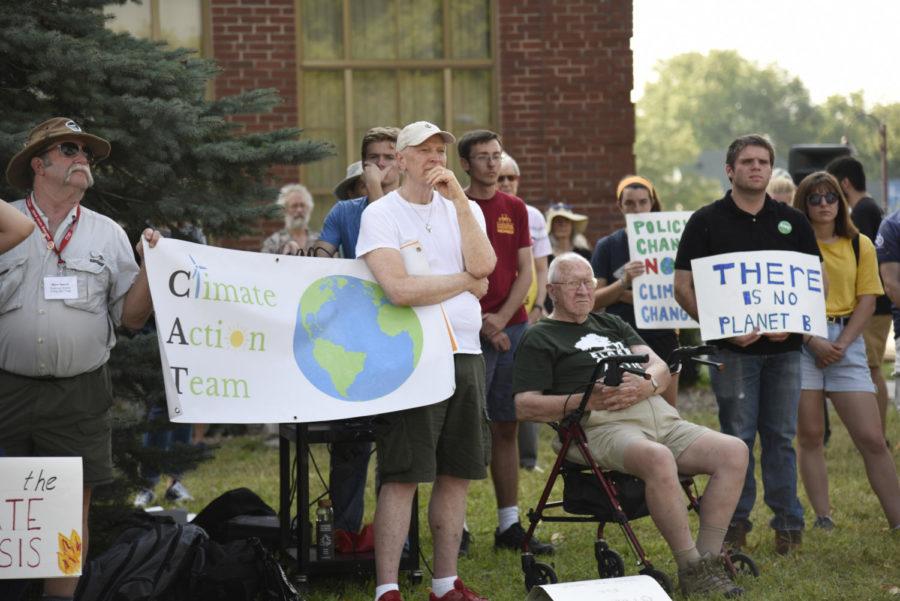- News
- News / Politics And Administration
- News / Politics And Administration / Campus
- News / Politics And Administration / City
Iowa State students join Ames climate strike
Caitlin Yamada/ Iowa State Daily
Protesters took part in a climate strike from 3 to 5 p.m. Friday at Ames City Hall. Different signs and speeches encouraged attendees to change habits to help the environment.
September 20, 2019
With 2020 being an election year, Iowans are preparing to caucus in the upcoming election and students are no exception.
Iowa State is a politically active university, with more than 30 student organizations and clubs dedicated to politics and activism. One of those clubs is the Iowa State College Democrats.
Abigail Meehan, College Democrats communications director and a sophomore in political science, said they think being involved in politics on campus is a broad spectrum that involves many different things.
“I think it is important to show students that getting involved doesn’t have to be intimidating or overwhelming,” Meehan said. “It should be exciting! It can be as simple as encouraging your friends to register to vote.”
There are many ways to get involved with the upcoming election, whether it be through student run organizations, door-knocking for different candidates, or campaigning on campus. Iowa State has many opportunities for students who choose to involve themselves in the upcoming election beyond just voting.
Andrea McConnell, a freshman in business, said she agrees that more students need to become involved in politics.
“I think it’s important to remind everyone that politics affect them,” McConnell said. “They need to understand that it’s their future too.”
Though it isn’t caucus season yet, campaigns have been preparing for caucus night for months, and in some cases, years. At the caucus, Iowans will gather at their respective party’s local precinct meeting spots to discuss and vote on candidates. The Iowa caucuses are the first nominating contest of the United States presidential primary season.
Iowa is known for sometimes picking the overall winner of the Democratic and Republican presidential nomination, but winning Iowa is not a guarantee for winning the nomination. In the past, the candidate who wins Iowa often turns the win into momentum for the remaining caucuses and primaries.
Caucusing and voting overall is new to many college students, with some not even old enough to vote yet. But ultimately, students should know they can have an impact on the outcome of the caucuses.
“I’ve talked to a lot of students who will say they don’t know who they would even caucus for, that it’s easier to just wait until after the primaries and just support that winner as they head into the election next November,” Meehan said. “I don’t think they realize how exciting and fortunate we are to be living in a state that plays such a pivotal role in deciding the future of the nation.”
However, students have busy lives. Between classes, clubs and jobs, there truly isn’t much downtime. So in order for students to have an impact on the caucus, they must show up on caucus night.
Mack Shelley, Iowa State professor and chair of the political science department, said he thinks a big factor in getting students to be present at the caucus is them doing their own research and finding candidates whose values align with their own.
“It’s a matter of whether you feel like these candidates speak to you,” Shelley said. “A good way to select which candidate to vote for is to listen if issues that are important to you get mentioned by that particular person.”
Megan Inman, freshman in event management, also said young people will have an impact on the caucus.
“The caucus will reflect the younger generation because of how progressive we are,” Inman said. “New voters are more open minded and show that through their choice of candidates.”
Inman said they look for candidates whose top values align with their own.
“The candidate should suit my needs, but also society’s needs as a whole,” Inman said.
An Iowa State poll of likely Iowa caucusgoers conducted by Civiqs found Sen. Bernie Sanders, I-Vt., leading Sen. Elizabeth Warren, D-Mass., by a 26-22 margin among the youngest age cohort in the survey — 18 to 34 year olds.







